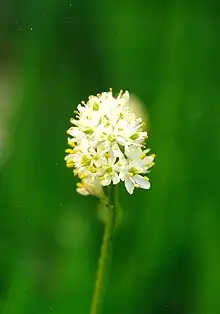Triantha
Triantha is a small genus of flowering plants in the family Tofieldiaceae, first described as a genus in 1879.[1][3] False asphodel is a common name for plants in this genus.[4]
| Triantha | |
|---|---|
 | |
| Triantha occidentalis | |
| Scientific classification | |
| Kingdom: | Plantae |
| Clade: | Tracheophytes |
| Clade: | Angiosperms |
| Clade: | Monocots |
| Order: | Alismatales |
| Family: | Tofieldiaceae |
| Genus: | Triantha (Nutt.) Baker |
| Synonyms[1][2] | |
| |
Triantha has four known species. One of these is endemic to Japan. The other three are native to North America.[2][5][6]
A comparison of DNA sequences has indicated that Triantha glutinosa might be two species.[7]
Before the family Tofieldiaceae was established in 1995, Triantha and related genera were usually placed in Nartheciaceae, Liliaceae, or Melanthiaceae, but molecular phylogenetic studies of monocots and Alismatales have shown that inclusion of Triantha etc. in these families makes them polyphyletic.
Some authors have included Triantha within the genus Tofieldia.[8] Triantha is distinguished from Tofieldia by its glandular-pubescent stems and by the presence of seed appendages. In 2011, a study of two nuclear genes and ten chloroplast genes showed that Triantha and Tofieldia are monophyletic and closely related sister clades. The species of Triantha are so closely related that the authors could not resolve any relationships among them.[7]
It was reported in August 2021 that the species Triantha occidentalis is carnivorous, catching insects with sticky hairs and enzymatic secretions on its stem.[9]
- Species[2]
- Triantha glutinosa (Michx.) Baker - sticky asphodel - Canada, Alaska, Great Lakes region, Maine, scattered other spots in USA
- Triantha japonica (Miq.) Baker - Honshu
- Triantha occidentalis (S.Wats.) R.R.Gates-western false asphodel - Western Canada (Alb, BC), western United States (AK WA OR CA ID MT WY)
- Triantha racemosa (Walter) Small-coastal false asphodel - Coastal Plain of United States from TX to NJ
References
- "Tropicos | Name - Triantha (Nutt.) Baker". www.tropicos.org. Retrieved 2017-02-02.
- "World Checklist of Selected Plant Families: Royal Botanic Gardens, Kew". apps.kew.org. Retrieved 2017-02-02.
- Baker, John Gilbert. 1879. Journal of the Linnean Society, Botany 17(2): 490-491 in Latin
- USDA, NRCS (n.d.). "Triantha". The PLANTS Database (plants.usda.gov). Greensboro, North Carolina: National Plant Data Team. Retrieved 14 December 2015.
- "Triantha in Flora of North America @ efloras.org". www.efloras.org. Retrieved 2017-02-02.
- Biota of North America Program 2013 county distribution maps Image
- Hiroshi Azuma and Hiroshi Tobe. 2011. "Molecular phylogenetic analyses of Tofieldiaceae (Alismatales): family circumscription and intergeneric relationships". Journal of Plant Research 124(3):349-357. doi:10.1007/s10265-010-0387-5
- "Tofieldia in Flora of North America @ efloras.org". www.efloras.org. Retrieved 2017-02-02.
- Qianshi Lin, Cécile Ané, Thomas J. Givnish, and Sean W. Graham. 2021. “A new carnivorous plant lineage (Triantha) with a unique sticky-influorescence trap”. PNAS 118(33). doi:10.1073/pnas.2022724118